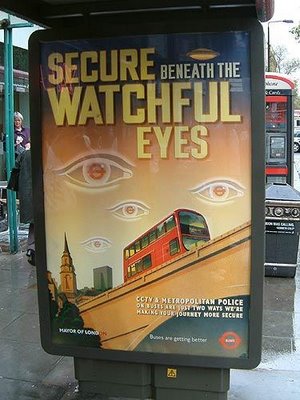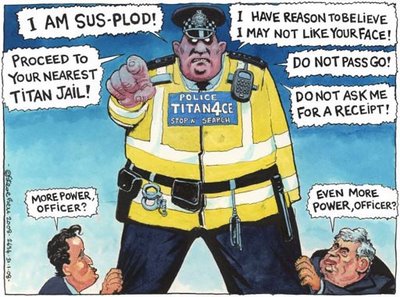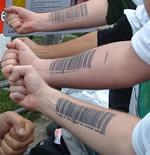Sleepwalking towards a police state.
 Such has been the casual but persistent dilution of liberties since New Labour came to power, it's become all too easy to scream about the coming police state, with the argument always focused on the dichotomy between security and liberty, that at times it's been rather swept under the carpet whether at times Labour has specifically intended to reach the position we're currently at. There's no doubt that they have encouraged and abetted, for example, the world's largest number of CCTV cameras, while there is not a single scrap of evidence that they even begin to prevent crime, even if they personally have not been behind the huge increase.
Such has been the casual but persistent dilution of liberties since New Labour came to power, it's become all too easy to scream about the coming police state, with the argument always focused on the dichotomy between security and liberty, that at times it's been rather swept under the carpet whether at times Labour has specifically intended to reach the position we're currently at. There's no doubt that they have encouraged and abetted, for example, the world's largest number of CCTV cameras, while there is not a single scrap of evidence that they even begin to prevent crime, even if they personally have not been behind the huge increase.Likewise, when they introduced section 44 of the Terrorism Act 2000, they may not have intended that the police would routinely abuse it and use it as a power to stop and search when the other applicable authorisations could not be justified, but they must have known full well that whenever the police are given a new power to detain, search or arrest, that it takes a great deal of restraint for them not to routinely use it for purposes for which it was not intended.
With this in mind, it's incredibly easy to be greatly cynical about the new offence created in the latest and greatest "Counter-Terrorism" Act. Contained in section 76 is the criminalisation of "[E]liciting, publishing or communicating information about members of armed forces etc", which you would imagine ostensibly is intended to stop individuals, such as those convicted of plotting to kidnap and behead a Muslim soldier, from compiling information on potential targets, whether it be home addresses or photographs of soldiers themselves. That alone is contentious; what is even more contentious is that this covers not just members of the armed force and the intelligence services, but also humble police constables.
It's rather difficult not to connect this directly to what has become more than just individual, jumped-up officers of the law asking members of the public what they're doing when they're seen taking photographs of almost anything, as has become almost routine for some whose simple pleasures including taking pictures of buildings, or even getting a camera out in the vicinity of children. While this does not directly cover that, what it will directly cover is the photographing of police officers, which has also become something of a point of concern, with those photographed routinely demanding that such pictures be deleted, even going so far as to confiscate the devices if they're digital and doing it for them. This has been especially noted on demonstrations, where ironically there are now almost always dedicated teams of officers, known as Forward Intelligence Teams, who film and take photographs of everyone, regardless of whether there is even the slightest likelihood of violence or the breaking of the law. FIT was originally set up to monitor football crowds for hooligans; now those exact same methods are used to do little more than intimidate peaceful protesters.
In response, the likes of FIT Watch have been set up to give the officers a taste of their own medicine. It could be argued that the archives of FIT Watch could be used by those with less salubrious methods to target officers for far more than just tit for tat gestures, but the chances of this seem to be negligible. Rather, what section 76 does is simply put into law what the officers have already been unofficially practising for some time.
The consequences of this could not potentially be more serious. It essentially means that anyone who comes across an instance of the police abusing their powers and manages to record it can have their evidence destroyed with next to no powers of appeal. It will further empower officers to intervene with photographers regardless of what they are doing. It in effect gives carte blanche to the police to stop anyone from recording almost anything, with the excuse being they themselves might be the ones being targeted. Furthermore, because of the vagueness of the legislation, which is almost certainly deliberate, it's up to the police and the courts themselves to intrepret when there was a breach. It's a recipe for completely disempowering the individual while empowering the authorities of the state to do almost whatever they feel like, with little sanction for appeal.
I've long argued that rather than this country becoming a police state, as some have in the past seriously suggested, what we have instead become is an incompetent surveillance society, built on the false idea and justification that surveillance equals security. Section 76 however moves us on from there: it puts not just the armed forces and the security services but also the police force almost completely above the law, able to control anyone who dares to question their authority through the camera. Richard Thomas, the information commissioner has long said that we are sleepwalking into a surveillance society; we now in fact appear to be sleepwalking fully towards that long feared but prophesied police state.
Labels: civil liberties, Counter-Terrorism Act 2008, photography, police, police state, section 76, surveillance state




